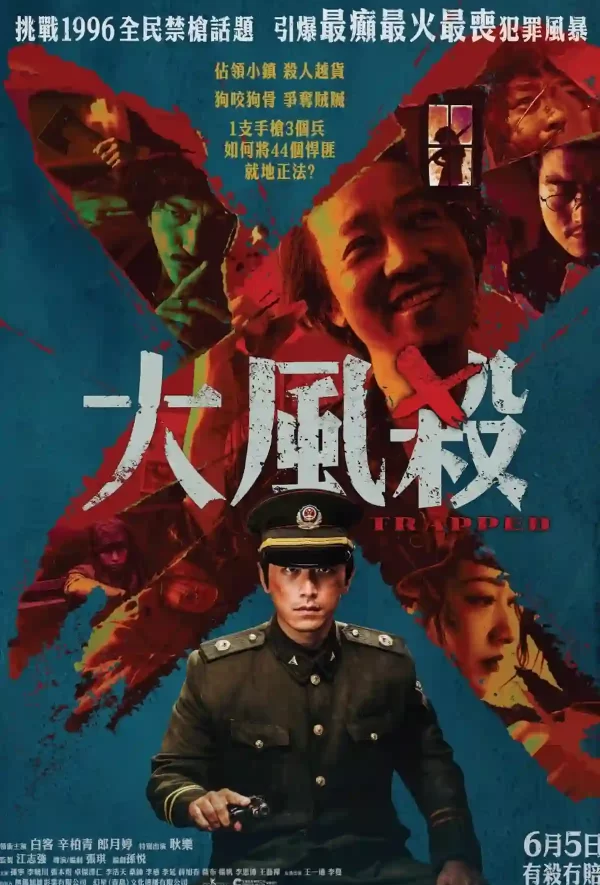Trapped
Cast & Crew
Plot Core: Survival Struggles in a Border Town
The story is set in the fictional border town of "Mangya" one year before the gun ban takes effect. Crime lord Beishan (Xin Baiqing) pretends to escape from prison but actually leads 43 henchmen back to recover a massive treasure, using force to seal off the town and cut off fuel and communications, intending to plunder wealth during the policy vacuum. Only three police officers remain in the town: the battle-hardened "Night Owl" Xia Ran (Bai Ke), rookie officer Jian Ning (Sun Ning), and veteran officer Zuo Luo (Li Xiaochuan). They face a daunting challenge of one gun against 88, engaging in a deadly struggle amidst a raging sandstorm.
Director Zhang Qi cleverly elevates the "police-criminal confrontation" into a metaphor for the times. Beishan’s gang employs a "corporate division of labor" to plunder the town, from the arrogant "sentinel" Quma Duo (Geng Le) to the calculating gang accountant (Zhang Benyu) and the "working gangster" Gangbeng (Wang Yitong), creating a precarious web of hidden interests. Xia Ran, using his investigative instincts, seeks opportunities amid the gang's infighting, leading to an ultimate showdown of "intellect defeating violence" in the storm.
Character Depth: Mirrors of Violence and Loneliness
Beishan (Xin Baiqing): Subverting traditional villain tropes, he alternates between a crazed demeanor, such as stepping on glass barefoot, and reciting "Man Jiang Hong," revealing absurd poetic elements. His "elegant tyrant" persona reflects the loneliness and fear behind the cult of violence, with scenes of him gambling the lives of townspeople heightening the complexity of his character.
Xia Ran (White. K or Bai Ke): Shedding his comedic label, Bai Ke portrays the redemptive journey of a traumatized hero. From trembling gun muzzles to the distant gaze in the rearview mirror, he intricately depicts a police officer's psychological struggle in dire circumstances, praised as a "transformation from Wang Dachui to a lone detective."
Gang Sister Li Hong (Lang Yueting): Positioned in a power struggle but unwilling to be a pawn, her line in the trailer, "Which of you bastards knows where she is?" hints at the internal machinations within the gang.
Production Highlights: Sandstorm Aesthetics and Temporal Metaphors
The crew spent six months constructing the real-life setting of "Mangya," using contrasting red and green visuals to enhance the good-versus-evil theme: the police station's dark red walls juxtaposed with the eerie green glow of neon lights during the gang's rampage, symbolizing the struggle between law and violence. The sandstorm in the film serves not only as a visual spectacle but also symbolizes the historical tide sweeping away the old order—when gunfire is drowned out by the wind, what remains are the remnants of the police and gang battle, along with a deconstruction of the "myth of violence."
Director Zhang Qi, who previously worked as the editing supervisor on "Youth," masterfully controls the film's pacing: the opening shot of a dust-covered, abandoned marketplace sets a deadly tone, interspersed with sharp cuts of Beishan's gang purging traitors, creating a suffocating sense of pressure.
Social Impact: Philosophical Inquiry into Violent Narratives"Trapped" breaks free from traditional police and crime film frameworks, questioning the boundaries of survival and morality through its extreme setup of "3 police vs. 44 gangsters." Critics have lauded its ability to "wrap profound thoughts in raw madness," as Beishan taunts Xia Ran with, "If you can hold on, it's worth it," directly addressing the essence of heroism. The gunfire that disappears in the sandstorm at the end symbolizes the ultimate conclusion of a violent destiny in a lawful society.
After the film's release, the "#Night Owl Survival Rules" trend surged on Weibo, with discussions on Bai Ke's "anti-hero" portrayal of trembling with a gun; Douyin also saw the "#Trapped Red and Green Filter" challenge, recreating the film's signature aesthetic. Additionally, the closing credits read, "This film is dedicated to all those who have left their marks on the steel plates of the era," resonating with audiences regarding the societal transformations of the 1990s.
Viewing Guide and In-Depth Analysis
Historical Context: The film depicts the lead-up to the 1996 implementation of China's Gun Control Act, realistically capturing the era's "rampant black market firearms."
Recommended Highlights: If you favor "action scenes," focus on the car chases and street gunfights amid the sandstorm; if you are interested in "character exploration," don't miss the internal dialogue between Beishan and Xia Ran.
Hidden Details: The gang accountant's abacus is inscribed with "1995.12.31," hinting at the countdown to the gun ban; Xia Ran's office wall features a torn page from the "People's Police Regulations," symbolizing the conflict between the system and the individual.
"Trapped" uses "violence as a mirror, sandstorms as a backdrop," redefining the height of Chinese crime genre films while providing a poignant commentary on individual destinies during a time of change. As producer Jiang Zhiqiang stated, "This is not a simple confrontation between good and evil, but a tragic elegy for all those who maintain clarity amid chaos."
- Release Date2025 年 5 月 1 日
- Regions
- Runtime2 hours 11 minutes
- Picture Format
- Film Festivals
- Beijing International Film Festival
- User Reviews
- IMDb RatingN/A

